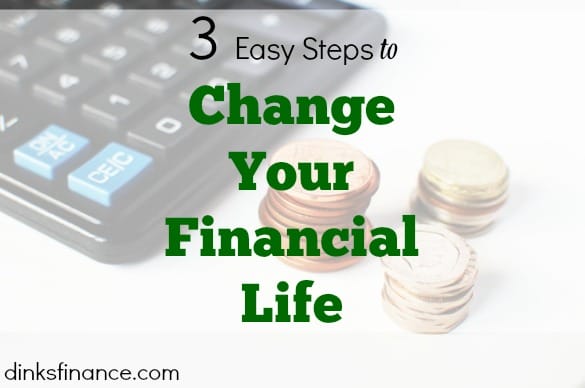
If your current financial situation is less than ideal, there are many ways that we can improve our personal finances. Like any major life change we shouldn’t expect it to happen overnight, our finances will eventually change as long as we take the necessary steps to turn our financial lives around.
Getting into a financial mess is very easy, but getting out of it can be very difficult if we don’t have an action plan. Sometimes when we are drowning in debt, not paying our bills on time, or living pay check to pay check we can’t see the bigger picture. We don’t see the light at the end of the tunnel and therefore we don’t make any changes to our financial lives. We don’t make changes because we don’t think that a small change can make a big difference. However the truth is that big changes usually start with a small beginning. The most important move towards a happy financial future is taking the first step now.
Poor money management, unhealthy spending habits, and loads of debt should be treated like any other type of addiction. We have to be ready to make a change because we will never change until we want to. Banks can deny our loans, Equifax can trash our credit score, and Amex can cancel our credit card, but we will never really make a change in our financial life until we admit that we have a problem and realize that it’s time for change.
Use these 3 steps to help change your financial life
1. Start Making Payments. Even if your debt balances seem overwhelming and it feels like your large balance will never be at zero just start making payments. Making only the minimum monthly payments helps keep our account up to date and it can also can help our credit score increase, but it doesn’t help our balances get paid off faster. Making regular payments to our debts and paying more than the required minimum monthly payment helps our debts get paid off sooner and it will also help us save on interest costs. This is true for making debt payments as well as paying our monthly bills.
2. Stop Getting Into Debt. If you have revolving credit products such as Credit Cards or Lines of Credit then you are used to regaining access to your available credit balance every time you make a payment. However using our available credit is a big financial mistake and it doesn’t help us pay off our debts sooner. We have to change our debt mentality to think that we don’t have any available credit, this way we won’t continue using our Credit Cards and our debt will get paid off faster. Once our debts are paid off we can close unwanted Credit Cards. We can keep one or two Credit Cards open for emergency purposes and to help rebuild our credit score if our loads of debt tarnished it in the past.
3. Start Saving. After our debts are more than half paid off we can start saving money. Some people like to make sure that all of their debts are paid off in full before they start saving, but this is not necessary. Once our debts are paid off by half the total amount we owe we can start saving. By this time we are well on our way to breaking our old bad financial habits. Once our debt is paid down by half we have two choices, we can continue using our fixed monthly payments to get our debts paid off in full or we can use a portion of our regular monthly payments to start saving. As our savings grow and our debts get paid off our Net Worth will increase and so will our credit score.
Photo by sophiea



It’s funny how many times I’d heard my fiance say, “it’s not that easy…”, in regards to taking care of his debt like you outlined above. As of last year, he started practicing the three steps you listed, and now he’s already paid off three different loans of several thousand dollars total.
I guess it may sound too simplified at first, but it really is that effective. Thanks for the post :)
I’m not sure about your 3rd step. In most cases, a person’s debt is at a much higher interest rate than what you would make on any savings. So technically you’d save more money by completely paying off debts first. One exception is probably to create at least a modest emergency fund to wean yourself off of the habit of using credit as backup.
An excellent, feasible three-step starting process. The first few steps to improve things are always the most difficult, but also the most rewarding!
Although, I’d make sure to have a little bit in savings when you start…just in case.
My first thought was that this list was way too simplistic. But after thinking about it, and thinking about the type of people that need this advice, it is actually very good. Sure, you can make finances very complex, but if money is tight and getting worse, simple works. The only thing i would add is instead of just saving for 3, to actually cut costs.
Getting started is the first step because if we never start then we can never finish.
@Kris – That’s a great tip. Cutting costs can also help save money.
Pingback:Financial Regrets and Money Mistakes. | DINKS Finance